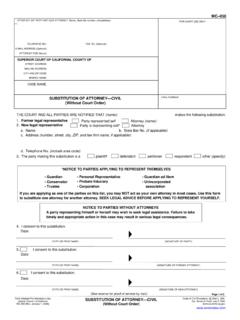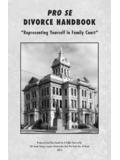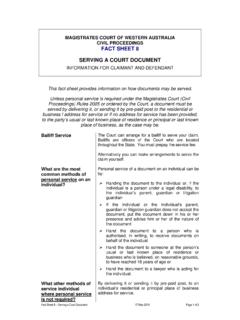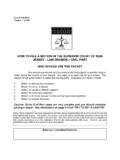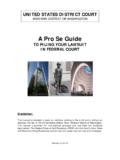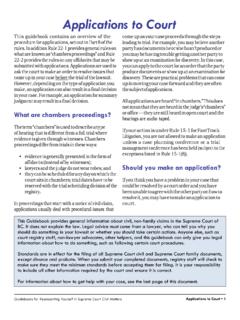Transcription of Civil litigation - Paralegal College UK
1 1 Civil litigation This document contains important information about your course. An online law course for paralegals, legal apprentices and litigants-in-person. Courses may be commenced at any time. No additional fees are charged for examination re-sits or the issuing of certificates. For the Paralegal Certificate in Civil Lit igat ion Dr John Olsson 2016 Dr John Olsson lectures at the Bangor School of Law, North Wales. He has been an expert wit ness for over 20 years and ho lds a first class law degree. He undertakes private Paralegal work and is a Fellow of the Institute of Paralegals.
2 John Olsson BSc (Psych), MA, MPhil, PhD LLB (Hons) (First Class) Bangor 2012. Course accredited by2 Civil litigation course Aim of the course This course is intended for study by those who need to become familiar with all aspects of Civil claims as quickly and as efficiently as possible. Primarily written for paralegals and apprentices, this course will also be useful for litigants-in-person. The aim is to help a person with, in many cases, no more than school leaver qualifications, to become legally useful in a relat ively short period of time.
3 By legally useful we mean someone who is able to handle one or more stages of a Civil matter with a reasonable degree of competence and the minimum of supervision. Two things will impress your supervisor or mentor at work above all else: a preparedness to work hard and a readiness to learn from your mistakes. A good supervisor will help you to critique your own mistakes in a positive way and to learn from them. In the case of paralegals and apprentices the more you are able to do competently, the more your firm will be able to use its senior staff on complex and strategic matters to the greater benefit of the firm (which includes you), while at the same time enabling you to improve your commercial value in the wider legal market place.
4 For the litigant in person, the rapid development of necessary skills will help to reduce the costs in bringing or defending a claim, and also to mitigate the ever-present perils of litigation . For all categories of learner, there is the additional pleasure and confidence to be gained from obtaining a valuable set of practical skills. Once you begin to understand the law and how it works, both in and out of court, you will derive huge satisfaction from your work. 3 Preface Nowadays, anyone can become a lawyer if he or she is prepared to work hard, and can get along with people, enjoys studying, and possesses a reasonable amount of patience and common sense.
5 Because the lega l profession has opened up so much in recent years, paralegals are now handling almo st all t y pe s of law work, including some work which was once reserved for solicitor s and barristers. The 2012 Skills For Justice survey opened up matters even further, an d has arguably led the way to mor e and more law firms adopting the lega l apprenticeship approach to training. The career that you have chosen has lo ng since shed its stuffy image an d is, in fact, one of the mos t exciting, challenging professions available.
6 It has a huge variety of work, and a niche for almo st ever yo ne from probate to property, from crime to commerce, from housing to human rights. The law is, literally, a field without limits. Litigants in person are also achieving considerable success in some cases and so this course is written for you if you are a litigant fighting your own case. If you are representing yourself, you may wish to read our Note to the Litigant in , this course is written for anyone who wants to become a lawyer, whatever his or her background.
7 It is true, that it might help if you have a strong academic record, but you do not need one to pass this course, and to pass it well. This is a practical course, designed to be understood by everyone who wishes to attain a working knowledge of making and defending claims in Civil courts in England and Wales, including lit igants in person (LIPs). The current version of the Civil Procedure Rules has been used to ensure that you are provided wit h the most up-to-date information, and our websit e will contain revisions as soon as we become aware of them.
8 If you are working in a law firm, you should have access to online versions of the White Book and other relevant publications, as well as such valuable services as Lexis Nexis, Westlaw and Justis. Get your firm to provide training in how to use those facilit ies they will be absolutely invaluable to you, and they contain an unimaginable body of learning, facts and genuine legal wisdom, not to ment ion legal precedents from important cases and the latest updates on legislat ion. This course consists of ten modules, each dealing with a specific topic or stage in the lit igation process.
9 Every mo dule has its own test. Periodically, questions are replaced, particularly as new rules are brought in by the Civil Procedure Rules Committee, or where there are relevant changes in the law. You will be informed of any relevant updates. The final examination for the mo dule will be taken under more traditional examination conditions (further details below). 4 If you are a Paralegal or legal apprentice you are encouraged to discuss yo ur studies w it h a supervisor or mentor at your law firm.
10 Nothing beats professional experience. Working in your firm on a day to day basis, alongside more experienced colleagues, will provide you with the practical aspects of what this course teaches you. 1. Read and study a module. 2. Take the test and submit it for feedback. Wait for feedback before proceeding to the next module. 3. Obtain feedback and when you are confident you have mastered the material of that module, proceed to the next module. 4. The module tests can be taken open book, but try to take them without relying on anything other than what you have learned.

